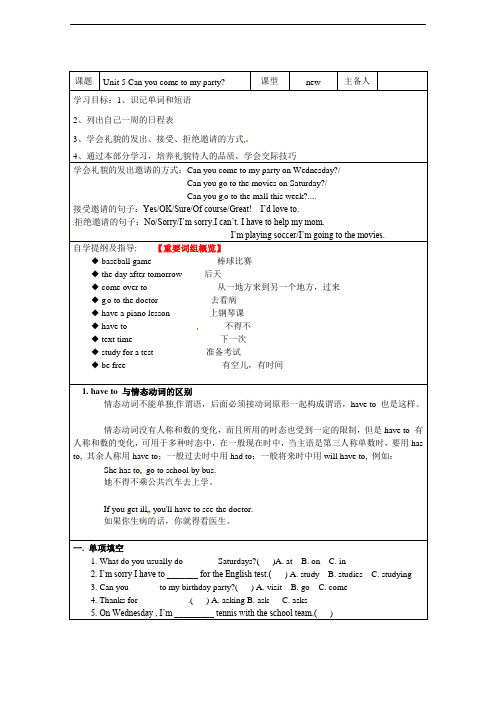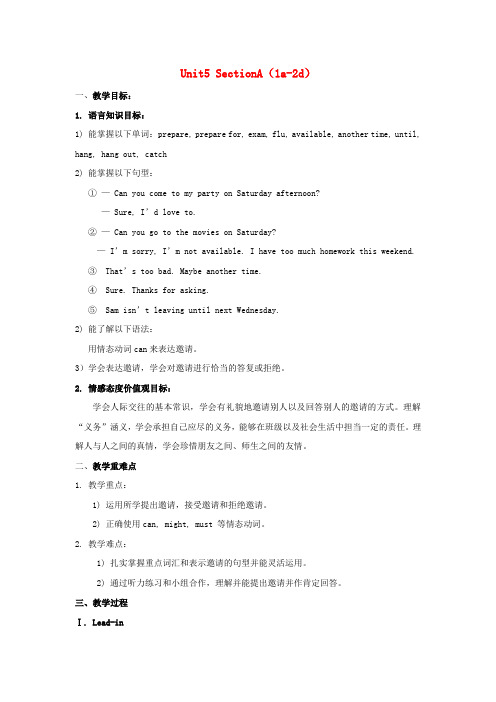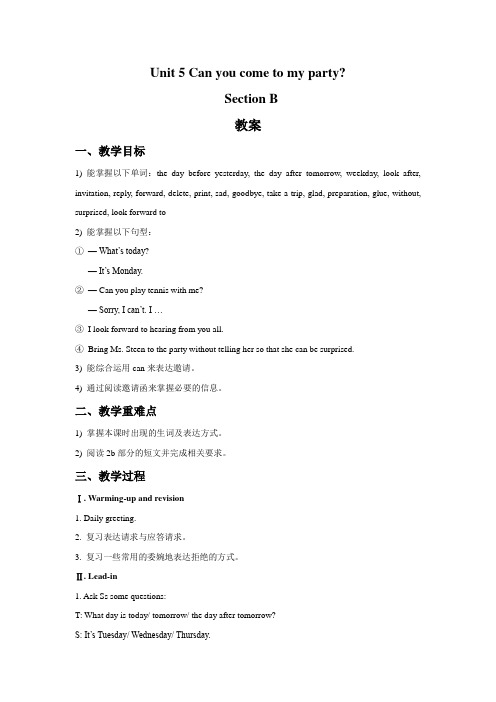英语鲁教版七年级下册unit5canyoucometomyparty知识点及单元检测
2024七年级英语下册Unit5Canyoucometomyparty单元主题写作课件鲁教版五四制

_H__a_p_p_y__b_ir_t_h_d_a_y_,_H__e_le_n_!_______________________________ ______________________________________________Y_o_u__rs_,_ _______________________________________________J_e_n_n_y_
结尾句 1. I can’t wait to... 2. I hope ... 3. Maybe another time would be fine.
四、写作任务 假如你是珍妮,下面是海伦发给你的邀请信。请你根据
以下要点提示给海伦发一封电子邮件回复该邀请信。
Dear Jenny, I’d like to invite you and your sister Mary to my
Yours, Helen
要点提示: 1. 你的妹妹玛丽能去参加生日聚会; 2. 你不能去,因为下周一你们学校要举办一场音乐会来庆 祝新图书馆的落成,你要去音乐俱乐部练习弹钢琴; 3. 虽然不能去参加晚会,但你会为海伦做一个巧克力蛋糕 作为生日礼物送给她; 4. 可自主发挥其他。
要求:语句通顺,词数70 左右;不得出现真实的校名、地名、 人名。
【写作模板】
Thank A/R Hope
Thank you for ... I’m sorry I won’t ... Happy birthday...
【高分作文】 __D_e_a_r__H_e_l_en__, _________________________________________ _____T__h_a_n_k_s__fo_r__y_o_u_r__in__v_it_a_ti_o_n_._I_’_m__g_l_a_d__t_o_t_e_ll__y_o_u__th__a_t _ __M__a_r_y_w__il_l_g_o__t_o__y_o_u_r_p__a_rt_y__t_h_is__S_u_n_d_a_y_,_b__u_t_I_’_m__s_o_r_r_y_I__ __w_o_n_’_t__b_e_a_v_a_i_la_b_l_e_,_b_e_c_a_u_s_e_I__n_e_e_d__to__p_r_a_c_t_is_e__p_la_y_i_n_g__th_e__ __p_i_a_n_o__a_t_t_h_e__m__u_s_ic__c_lu__b__to__p_r_e_p_a_r_e__f_o_r___th_e__c_o_n_c_e_r_t__to__ __c_e_le_b_r_a_t_e__t_h_e__o_p_e_n_in_g___o_f _o_u__r__n_e_w__l_ib_r_a_r_y_.__I’_l_l _m__a_k_e__a__ __c_h_o_c_o_la_t_e_c_a_k_e__a_s_a__b_ir_t_h_d_a_y__g_if_t_f_o_r_y_o_u_._________________
鲁教版英语七年级下Unit5 Can you come to my party

课题Unit 5 Can you come to my party? 课型new 主备人学习目标:1、识记单词和短语2、列出自己一周的日程表3、学会礼貌的发出、接受、拒绝邀请的方式。
4、通过本部分学习,培养礼貌待人的品质,学会交际技巧学会礼貌的发出邀请的方式:Can you come to my party on Wednesday?/Can you go to the movies on Saturday?/Can you g o to the mall this week?....接受邀请的句子:Yes/OK/Sure/Of course/Great! I’d love to.拒绝邀请的句子:No/Sorry/I’m sorry.I can’t. I have to help my mom.I’m playing soccer/I’m going to the movies.自学提纲及指导: 【重要词组概览】◆ baseball game棒球比赛◆ the day after tomorrow后天◆ come over to从一地方来到另一个地方,过来◆ g o to the doctor去看病◆ have a piano lesson上钢琴课◆ have to不得不◆ text time下一次◆ study for a test准备考试◆ be free有空儿,有时间1. have to 与情态动词的区别情态动词不能单独作谓语,后面必须接动词原形一起构成谓语,have to 也是这样。
情态动词没有人称和数的变化,而且所用的时态也受到一定的限制,但是have to 有人称和数的变化,可用于多种时态中,在一般现在时中,当主语是第三人称单数时,要用has to, 其余人称用have to;一般过去时中用had to;一般将来时中用will have to, 例如:She has to go to school by bus.她不得不乘公共汽车去上学。
鲁教版英语七下Unit5《Canyoucometomyparty》(SectionA1a-2d)word教案

Unit5 SectionA(1a-2d)一、教学目标:1. 语言知识目标:1) 能掌握以下单词:prepare, prepare for, exam, flu, available, another time, until, hang, hang out, catch2) 能掌握以下句型:① — Can you come to my party on Saturday afternoon?—Sure, I’d love to.② — Can you go to the movies on Saturday?—I’m sorry, I’m not available. I have too much homework this weekend.③ That’s too bad. Maybe another time.④ Sure. Thanks for asking.⑤ Sam isn’t leaving until next Wednesday.2) 能了解以下语法:用情态动词can来表达邀请。
3)学会表达邀请,学会对邀请进行恰当的答复或拒绝。
2. 情感态度价值观目标:学会人际交往的基本常识,学会有礼貌地邀请别人以及回答别人的邀请的方式。
理解“义务”涵义,学会承担自己应尽的义务,能够在班级以及社会生活中担当一定的责任。
理解人与人之间的真情,学会珍惜朋友之间、师生之间的友情。
二、教学重难点1. 教学重点:1) 运用所学提出邀请,接受邀请和拒绝邀请。
2) 正确使用can, might, must 等情态动词。
2. 教学难点:1) 扎实掌握重点词汇和表示邀请的句型并能灵活运用。
2) 通过听力练习和小组合作,理解并能提出邀请并作肯定回答。
三、教学过程Ⅰ. Lead-in1. 在大屏幕上向学生展示一张邀请函。
T: Hello, everyone! Yesterday I received an invitation letter from my dear friend; she invited me to go to her Halloween party. But I have something important to do. I’m studying for a test. I don’t kn ow what to do. What should I say? Can you help me? …2. Ss try to answer the questions.Ⅱ. Presentation1. 引导学生们看大屏幕上邀请及两个答语。
鲁教版五四制英语七年级下册Unit 5 Can you come to my party Secti

Unit 5 Can you come to my party?Section B教案一、教学目标1) 能掌握以下单词:the day before yesterday, the day after tomorrow, weekday, look after, invitation, reply, forward, delete, print, sad, goodbye, take a trip, glad, preparation, glue, without, surprised, look forward to2) 能掌握以下句型:①—What’s today?—It’s Monday.②— Can you play tennis with me?—Sorry, I can’t. I …③I look forward to hearing from you all.④Bring Ms. Steen to the party without telling her so that she can be surprised.3) 能综合运用can来表达邀请。
4) 通过阅读邀请函来掌握必要的信息。
二、教学重难点1) 掌握本课时出现的生词及表达方式。
2) 阅读2b部分的短文并完成相关要求。
三、教学过程Ⅰ. Warming-up and revision1. Daily greeting.2. 复习表达请求与应答请求。
3. 复习一些常用的委婉地表达拒绝的方式。
Ⅱ. Lead-in1. Ask Ss some questions:T: What day is today/ tomorrow/ the day after tomorrow?S: It’s Tuesday/ Wednesday/ Thursday.2. Then sing a song like the song of ABC.Sunday/ Monday/ Tuesday/ Wednesday/ Thursday/ Friday/ Saturday3. T: What was/ is the date yesterday/ the day before yesterday/ today/ tomorrow/ the day after tomorrow?S: 13th/ 14th/ 15th… Let the students ask these questions one by one.Explain the new sentence:“What’s today/ tomorrow/ the day after tomorrow?”“It’s Monday. / Tuesday. / Wednesday.”4. Show the days of the week in a large monthly calendar.Point out the days of the week at the top of the calendar and ask a student to read these words aloud. Ask a student to point out today’s date, tomorrow’s date, the day after tomorrow’s date and yesterday’s date. Complete activity 1a, check the answers. Ask students to write the words today, tomorrow, yesterday and the day after tomorrow in the correct spaces on the calendars in their books.Ⅲ. Discussion1. Work with your partners. Look at the chart in 1a. Then ask and answer with a partner.S1: What’s today?S2: It’s Monday, the 14th.Ⅳ. ListeningWork on 1c:1. Tell Ss to listen to Vince and Andy’s conversation. Then circle Yes or No.2. Play the recording for the Ss. Ss just listen for the first time. Play the recording again and circle.3. Play the recording and check the answers with the Ss.Work on 1d:1. T: Now please read Vince’s activities in 1d. Tell Ss they’ll liste n to the tape again. Then try to match Vince’s activities with the days in 1d.2. Ss listen to the recording carefully and try to match Vince’s activities with the days.3. Play the recording again and check the answers with the class.Ⅴ. Pair workWork on 2a:。
鲁教版英语七下Unit 5 Can you come to my party Section A 2

鲁教版英语七下Unit 5 Can you come to my party Section A 2d-3c 说课稿一. 教材分析鲁教版英语七下Unit 5 “Can you come to my party?”主要围绕着日常生活场景展开,通过学习本单元,学生能够掌握情态动词can的用法,以及如何邀请他人参加聚会并表达自己的喜好。
本节课的Section A 2d-3c部分,通过一个生日聚会的故事情境,让学生在真实的语境中运用情态动词can,提高学生的语言运用能力。
二. 学情分析学生在学习本节课之前,已经掌握了基本的日常英语对话,对于情态动词have 和there be的用法也有一定的了解。
但学生在实际运用中,往往会受到母语的干扰,无法准确地表达自己的喜好。
因此,在教学过程中,教师需要关注学生的语言运用,引导学生正确使用情态动词can。
三. 说教学目标1.知识目标:学生能够掌握情态动词can的肯定句、否定句和疑问句的构成及用法;能够正确运用情态动词can表达自己的喜好。
2.能力目标:学生能够在真实的语境中熟练运用情态动词can进行交流;提高学生的英语听说读写能力。
3.情感目标:培养学生热爱生活,乐于交友的良好品质;增强学生的团队协作意识。
四. 说教学重难点1.重点:学生能够掌握情态动词can的用法,并在实际情境中进行运用。
2.难点:学生能够正确表达自己的喜好,并在交际中灵活运用情态动词can。
五. 说教学方法与手段1.情境教学法:通过设定生日聚会的情境,让学生在真实的语境中学习、运用情态动词can。
2.任务型教学法:通过小组合作完成任务,激发学生的学习兴趣,提高学生的参与度。
3.交际法:鼓励学生积极参与课堂交际,提高学生的英语口语表达能力。
4.多媒体辅助教学:运用课件、视频等教学资源,丰富教学手段,提高课堂趣味性。
六. 说教学过程1.导入:教师通过提问学生喜欢的活动,引导学生回顾已学过的情态动词have,为新课的学习做好铺垫。
鲁教版英语七年级下Unit5 Can you come to my party

Unit 5 Can you come to my party?一. [话题](Topic) Invitations二. [重点词组](Key Phrases)1. Have a piano lesson2. Have math3. Have a test4. Study for a test5. What a small party!6. On Saturday7. Too bad!8. Too many9. Too old10. I can’t either.11. I can too.12. Next time13. Anther time14. Thanks for asking15. Say no to +N…16. Say yes to + N…17. Invite sb to do…=ask sb to do sth…三. [交际用语]1. Can you come to my party? 你能来我的聚会吗?Sure, I’d love to. 当然,我很愿意。
2. Can you go to the movies? I’m s orry.I have to help my mom.你能去看电影吗?对不起,我必须帮我妈妈。
3. Can she go to the baseball game? No, she can’t.She has to study for a test.她能去棒球赛吗?不能,她不得不为考试学习。
4. Can they go to the concert? No, they can’t.They’re going to a party.他们能去音乐会吗?不能,他们将去(参加)聚会。
四. [重点难点释义] (Language Points)1. 情态动词“have to”与其他的情态动词如:“can” , “may” “must”和“should”(应该)不同。
【精品】英语鲁教版七年级下册unit5 can you come to my party知识点及单元
英语鲁教版七年级下册U n i t5C a n y o u c o m e t o m y p a r t y 知识点及单元检测------------------------------------------作者------------------------------------------日期英语鲁教版七年级下册Unit5 Can you come to my party? 知识点及单元检测 2014/4/27一.重点词组1. Can you come to my party on Saturday afternoon?in:用在上午下午晚上,在月份、季节和年之前;on用在星期、日期、节日和特定的某一天前。
2. I’d love to. 表示愉快地答应别人的请求。
would like to do sth.意为不得不/必须做某事,否定形式don’t have to,意为“不必”;must也是必须,表示主观看法、需要,否定形式mustn’t,意为“千万不要”。
4. prepare v.准备【n.名词】preparation,prepare for sth.为……做准备 prepare for an examprepare to do sth.准备做某事 The students are busy preparing to go on the vacation.5. go to the doctor 去看医生 have the flu 患感冒=catch a cold,have a fever6. I’m not available. I have too much homework to do.我没空儿,我有太多的家庭作业要做。
be available有空的,可获得的:The tickets are not available now, because the concert is so popular.too much+不可数名词,太多……;much too+形容词:It’s much too cold outside, the temperature is below zero.7. until 直到……为止;到……时。
鲁教版英语七年级下册-Unit5-Canyoucometomyparty-重点句子
鲁教版英语七年级下册-Unit5-Canyoucometomyparty-重点句子Unit 5 Can you come to my party?1.短语准备一场英语考试为…做准备(动词短语)(名词短语)去看医生得流感/ /帮助分担…见朋友去骑行直到….才例句:与…一起出去闲逛计划做某事有时间做某事上一节钢琴课照顾,照料前天后天发出/ 接受/ 拒绝一个邀请/ /很高兴做某事很悲伤做某事做….的最好方式做….的最好时间有一个关于…的好主意把….带到去旅行在…结束的时候举办一个惊喜派对截止本周五目前期待,盼望做某事收到…来信2.发出邀请的句子:3.接受邀请4.拒绝邀请5.你能在星期六下午来我的聚会吗?you come to my party .你能和我一起去打网球吗?you play with me ?抱歉,我不能。
我得准备一场英语考试。
Sorry, I can’t. I.抱歉,我没空。
我这个周末有太多的家庭作业。
I am sorry. I’m not . I have this weekend.太糟糕了。
或许换个时间。
That’s too . Maybe.我可能得去见朋友。
I meet friends.我也不能参加。
I can’t, .我恐怕不行。
I’m .我没空。
I’m not / / .I don’t have any time.6.我需要带一些东西来吗?Do I ?7.我明天必须踢足球和上一节钢琴课。
I play soccer and tomorrow.8.你后天打算做什么?What / you / to do tomorrow?What will you do tomorrow?9.昨天是星期几?今天是星期几?昨天是几月几号?明天是几月几号?前天是星期几,几号?后天是星期几,几号?10.看到她走我很难过。
这次聚会是感谢和道别的最好方式。
I’m see her , and this party is say “thank you and ”.11.我能帮忙把Ms. Steen 带到聚会来。
2022年鲁教版七年级英语下册Unit5 Can you come to my party Sect
go to the movies
meet my friends
Explanation
1. can 的用法 (1)表邀请。若接受邀请,回答为: OK./All right./Sure./ Of course./Certainly./ Yes(Sure),I’d love(like) to. 若不接受邀请,回答为: Sorry,Ican’t.(+原因) eg . Can you come to the party? Yes/Sure,I’d love/like to. Sorry,Ican’t. I have to help my parents.
4. --__C_a_n__ you go to the concert? --Great! I’d ___lo_v_e_ __t_o__.
5. -- __C_a_n___ you go to the mall this week? --Sorry, I __ca_n_’_t__.
单项选择
1. I have ___B__ homework to do. A. too many B. too much C. much too D. a few 2. He __D_ stay at home, because his mother
(Tim, Kay, Anna and Wilson)
next to the correct students
in the picture.
Tim Anna Kay
Wilson
1c
You are the students in the picture. Student A, invite other students to your party. Student B, C, D ,E andF, give answers.
鲁教版英语七下Unit 5 Can you come to my party Section A G
鲁教版英语七下Unit 5 Can you come to my party Section A GrammarFocus-3c 教学设计一. 教材分析鲁教版英语七下Unit 5的主题是“Can you come to my party?”,Section A Grammar Focus-3c主要讲解了一般现在时和一般过去时的用法。
本节课通过一个生日派对的情境,让学生理解和掌握一般现在时和一般过去时的区别以及如何运用。
教材内容贴近学生生活,有利于激发学生的学习兴趣。
二. 学情分析七年级的学生已经学习过一般现在时,对一般过去时的概念有一定的了解,但对一般过去时的运用还不够熟练。
因此,在教学过程中,教师需要帮助学生巩固已学知识,并通过实践运用,提高学生运用语言的能力。
三. 教学目标1.知识目标:学生能够理解并运用一般现在时和一般过去时描述过去发生的事情。
2.能力目标:学生能够在实际情境中运用一般现在时和一般过去时进行交流。
3.情感目标:通过本节课的学习,学生能够提高对英语学习的兴趣,增强自信心。
四. 教学重难点1.重点:学生能够掌握一般现在时和一般过去时的用法。
2.难点:学生能够灵活运用一般现在时和一般过去时进行交流。
五. 教学方法1.情境教学法:通过创设生日派对的情境,让学生在实际情境中运用语言。
2.任务型教学法:通过完成各种任务,激发学生的学习兴趣,提高学生的语言运用能力。
3.交际法:通过小组讨论、角色扮演等方式,让学生充分参与课堂交流,提高学生的交际能力。
六. 教学准备1.教学课件:制作生日派对的相关课件,包括图片、视频等。
2.教学素材:准备一些与生日派对相关的句子,用于引导学生进行操练。
3.学生分组:将学生分成若干小组,每组4-6人。
七. 教学过程1.导入(5分钟)教师通过向学生展示一张生日派对的图片,引导学生谈论生日派对,激发学生的学习兴趣。
2.呈现(10分钟)教师通过课件向学生展示一般现在时和一般过去时的句子,让学生观察并找出两者的区别。
- 1、下载文档前请自行甄别文档内容的完整性,平台不提供额外的编辑、内容补充、找答案等附加服务。
- 2、"仅部分预览"的文档,不可在线预览部分如存在完整性等问题,可反馈申请退款(可完整预览的文档不适用该条件!)。
- 3、如文档侵犯您的权益,请联系客服反馈,我们会尽快为您处理(人工客服工作时间:9:00-18:30)。
英语鲁教版七年级下册Unit5 Can you come to my party 知识点及单元检测2014/4/27 一.重点词组1. Can you come to my party on Saturday afternoonin:用在上午下午晚上,在月份、季节和年之前;on用在星期、日期、节日和特定的某一天前。
2. I’d love to. 表示愉快地答应别人的请求。
would like to do sth.意为不得不/必须做某事,否定形式don’t have to,意为“不必”;must也是必须,表示主观看法、需要,否定形式mustn’t,意为“千万不要”。
4. prepare v.准备【n.名词】preparation,prepare for sth.为……做准备 prepare for an examprepare to do sth.准备做某事 The students are busy preparing to go on the vacation.5. go to the doctor 去看医生 have the flu 患感冒=catch a cold,have a fever6. I’m not available. I have too much homework to do.我没空儿,我有太多的家庭作业要做。
be available有空的,可获得的:The tickets are not available now, because the concert is so popular.too much+不可数名词,太多……;much too+形容词:It’s much too cold outside, the temperature is below zero.7. until 直到……为止;到……时。
unitl用于否定句时,主句的谓语动词常为非延续性动词,He didn’t go to bed until he finished his homework.用于肯定句时,主句谓语动词常为延续性,表动作一直延续到until的时间,例如:We will wait until she comes back.8. hang out 常去某处;泡在某处,hang过去式,意为。
go out eat out9. Catch you on Monday! 周一见catch过去式,及时赶上;接住;抓住 catch the ball catch the mousenot)catch the bus.10. invite v.邀请invite sb. to do sth.: He invites me to his birthday party on Saturday evening.invite sb. to place: The astronauts invite us to their training center.[n.名词]invitation I re ceived his invitation but I didn’t want to accept.11. accept v.接受,强调主观上愿意接受accept an invitation 接受邀请;receive,强调客观上收到,接收到。
She received an expensive present; however she didn’t mean to accept it.12. refuse v.拒绝=turn down,refuse sb. sth.拒绝某人某事refuse his invitation=turn down his invitationrefuse to do sth.拒绝做某事:The young man refused to give his seat to the old lady.13. another time 下次,其它时间 another+名词/代词,表示没有范围的另外一个,下一个14. the day before yesterday 前天 the day after tomorrow 后天15. look after sb./sth.照看;照顾=take care of sb./sth.16. reply v.回答,答复 reply to sb./ sth.:reply to her letter/ reply to the question reply in writing 书面回复17. (be/系) sad adj.(令人)悲伤的;难过的【n.名词】sadness 悲伤,伤痛be sad to do sth.: I’m so sad to hear that you’re sick.18. (be/系) glad adj.高兴的;愿意的 He is glad about his new job. be glad to do sth.很高兴/很乐意做某事19. surprise v.使……感到惊讶/惊喜 The good news surprises everyone.【名词】surprise party to one’s surprisesurprised adj.使人感到惊奇的 People feel surprised at the invitation.surprising adj. 令人惊奇的It’s really a surprising message.20. without prep.介词,没有;不(做某事)without+名词:Fish can’t live without water, people can’t live without air. without doing sth.:Many students go to school without having breakfast; however, it’s really bad for health.21. look forward to+名词/动词ing,盼望,期待 Each student looks forward to the winter vacation.23. I hope you can make it. make it能够出席/到场,还可意为“获得成功;准时到达,赶上”The train is leaving in a minute, we can’t make it.二、重点短语24. take a trip 去旅行=travel 25. the opening of … ……的开幕式/落成典礼26. last fall 去年秋天 27. go bike riding去骑车28. look forward to 盼望;期待 29. come over to my house 顺道来我家30. study for the exam备考 31. at the end of this month 这个月末32. reply in writing书面回复33. not … until 直到………才34. go to the concert去听音乐会 35. too much homework太多作业36. have a surprise party for sb.为某人举办一个惊喜派对三、重点语法1. what引导的感叹句结构:What+a/an+adj.+可数名词单数(+主语+谓语)! What+adj.+名词复数/不可数名词(+主语+谓语)!2. 询问星期几、日期What day is it today 今天星期几What’s the date today今天几号What time is it / what’s the time几点了What’s today 今天是几号,星期几----it’s Monday the 14th.3. 情态动词can①表示能力,一般指体力、技能等方面的能力,如:Can you play the piano②表示请求,允许,意为“可以”,不如May正式。
如Can you come to my party学会礼貌地给予答复—肯定回答:Sure, I’d love / like to;That sounds good!;That wouldbe nice, thanks! 否定回答:Sorry, I can’t.;I’d love to, but I’m afraid I have no time.③表示推测,意为“(不)可能”can表推测时,一般用于疑问句和否定句,更常用于否定句,表示很确定的“不可能”。
I saw Jim in the school library just now, he can’t be here.Someone is knocking at the door, who can it be④情态动词can / have to/ need/ must (较难点)can 是能不能,能够做某事; have to不得不,强调客观上的原因迫使不得不去做某事;need 有没有必要,需不需要做某事;must 是必须做某事,具有强制性的意味。
Unit 5 Can you come to my party 单元检测情态动词canI. 按要求改写下列句子。
(a)Tom can play the piano well.1. (改为否定句) ______________________2. (改为一般疑问句) ______________________(b)I can go to her birthday party this weekend.3. (改为否定句) ______________________4. (改为一般疑问句) ______________________Ⅱ. 选择填空。
( ) 1. — __________ you call back tomorrow—Yes, I can.A. ShouldB. NeedC. MustD. Can( ) 2. — Can I __________ over to your house to listen to CDs — Yes, you can.A. comeB. cameC. comingD. to come( ) 3. — Can you go to the movies with us tomorrow night— __________.A. Sure, I’m busyB. Sure, I’d love toC. Sorry, I’d love toD. I’m sorry I won’t( ) 4. — Can you go to the supermarket with me this weekend— _________. I have to help my parents with housework.A. Sure, I’m busyB. Sure, I’d love toC. Sorry, I’d love toD. I’m sorryⅠ.单项选择1.I have to______for the math test. A.study B.studying C.learning D.studied2.My best friend often invites me ______ delicious food. A.enjoy B.enjoying C.enjoyed D.to enjoy3.I am going to ______ you on Sunday and go bike riding. A.catch B.accept C.refuse D.delete4.Do you know ______ I miss you A.how many B.how much C.how long D.how far5.Please reply to the invitation ______ by next Tuesday. A.call B.in call C.in calling D.for calling6.Joe______go to the leg is broken. A.have to B.can C.has to D.may 7.—Sorry,but I have to look after my brother.—That's .A.bad;another B.bad;other C.good;another D.good;other8.—Would you like to visit the museum—______A.Yes,please. B.Sure,I'd love to. C.Sorry,I wouldn't. D.Yes,I would.9.Can you look at the ______ and tell me the activities A.menu B.calendar C.clock D.phone10.Sorry,I'm busy have ___ housework to do.A.much too B.too much C.too many D.many too11.Can you play football ______ us this afternoon A.with B.at C.on D.around 12.Thanks a lot for____me____your house.A.invite;for B.invite;to C.inviting;for D.inviting;to13.—______I watch TV,Mum —Sure,but you______finish your homework first.A.Must;needn't B.Can;may C.Can;must D.May;mustn't14.The students are very ______ at the ______ news.A.surprised;surprising B.surprising;surprised C.surprised;surprised D.surprising;surprising 215.—My mother is have to look after her at home.—______.A.Thank you B.Oh,I don't know C.Bad luck D.I'm sorry to hear that Ⅱ..阅读理解AIn Canada and the United States,people enjoy entertaining(请客)at often invite friends over for a meal,a party,or just for a coffee and conversation.Here are the kinds of things people say when they invite someone to their home:“Would you like to come over for dinner Saturday night”“Hey,we're having a party on you come”To reply to an invitation,either say thank you and accept,or say you're sorry,and give an excuse:“Thanks,I'd love time would you like me to come”or “Oh,sorry,I've tickets for a movie.”Sometimes,however,people use expressions that sound like invitations but which are not real example:“Please come over for a drink sometime.” “Why not get together for a party sometime” “Why don't you come over and see us sometime soon”They are really just polite ways of ending a are not real invitations because they don't mention a specific(确定的)time or just show that the person is trying to be reply to expressions like these,people just say “Sure,that would be great!”or “OK,yes,thanks.”So next time when you hear what sounds like an invitation,listen carefully:Is it a real invitation or is the person just being friendly26.Why do Canadians and Americans often invite friends for meals at home A.Because they can save .Because they can spend less money.C.Because they enjoy entertaining at home. D.Because they have modern and beautiful house.27.Which of the following is a real invitationA.“If you are free,let's go for a dinner sometime.”B.“Please go to the cinema with me someday.”C.“Would you like to have a cup of tea with us sometime”D.“I've two tickets you go to the movie with me”28.If people say “Let's get together for lunch some day.”,you just say “______”A.That would be nice. B.How about this weekendC.Oh,'m very busy. D.That's 'll be there on time.29.People use “an unreal invitation” in order to(为了)show that ______.A.they're trying to be friendly B.they're trying to be helpfulC.they're trying to make friends with others D.they haven't got ready for a party yet30.The passage is mainly about______.A.entertainment at home B.real invitations or notC.expressions of starting a conversation D.ways of ending a conversationⅤ.用所给词的适当形式填空46.I'm looking forward to ______(hear) from you soon.47.Tom______(can)come to my party because he is ill.48.Thank you for your______(invite).49.Please keep quiet!My sister's trying______(study).50.He would love______(have)a cup of tea.Ⅶ.书面表达(共20分)根据提示写一封60~80词的信。
